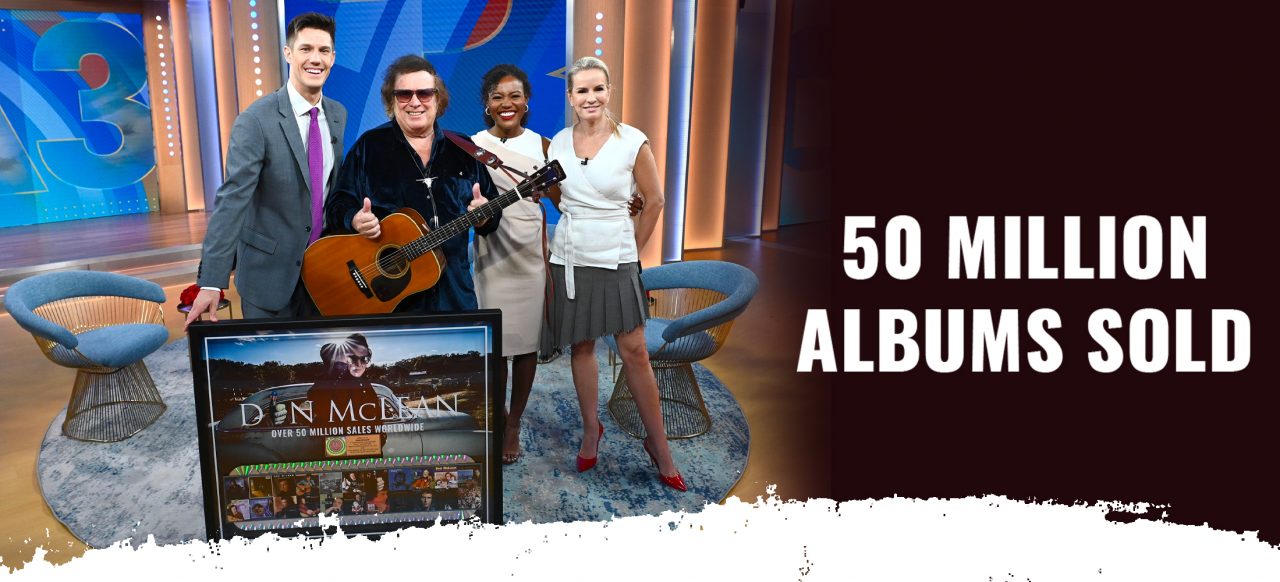Photo: Don McLean (from his website) | By Jim Farber, The Guardian | A long, long time ago – five decades to be exact – America was roiled by wrenching generational showdowns, massive street protests, and a blazing array of social justice movements. Now, half a century later, similar events and dynamics dominate the public conversation. So, perhaps, it’s poetic that precisely five decades have elapsed since a song that captured all that cultural turmoil, American Pie, became a smash hit. “It’s a song that spoke to its time,” said Spencer Proffer, who has produced a comprehensive new documentary about the song, titled The Day the Music Died. “But it’s just as applicable now.”
In fact, American Pie has only gained in fans and expanded in meaning as it has hit successive generations and generated fresh covers. Over the years, it has been interpreted by artists from Madonna (who created a commercially triumphant, if aesthetically limp, take in 2000) to Garth Brooks to Jon Bon Jovi to John Mayer. Throughout the years, journalists have subjected the song to a Talmudic level of scrutiny, while its songwriter, Don McLean, has doled out dribs and drabs of insight into his intent. By contrast, the new documentary offers the first line-by-line deconstruction of the song’s lyrics, as well as the most detailed analysis to date of its musical evolution. “I told Don, ‘It’s time for you to reveal what 50 years of journalists have wanted to know,’” Proffer said. “This film was a concerted effort to raise the curtain.”
In addition, it offers an emotional account of the tragic event that McLean used as his jumping off point for the larger story he wanted to tell.
The event, which McLean dubbed “the day the music died”, shattered the pop world of its day and had a formative effect on the songwriter. On a frigid night in 1959, a small plane carrying Buddy Holly, Ritchie Valens and JP Richardson (The Big Bopper) crashed in a corn field in Clear Lake, Iowa, minutes after take-off, killing everyone on board. The documentary begins with that event, traveling back to the Surf Ballroom, where the stars played their final show. The film-makers scored a coup by bringing on camera a man who saw that fateful concert, as well as the man who owns the aviation company that rented the doomed plane. More, it features a moving interview with Valens’ sister Connie, who we see thanking McLean for immortalizing her brother in song.
The first part of the film covers McLean’s early life, including his time as a paper boy in the suburb of New York City where he grew up. In an extensive interview for the film, McLean talks about delivering the paper that carried news of the crash, something he alludes to towards the start of the song’s lyrics. At the time, Buddy Holly was his musical idol. If his death instigated the song’s words, a more personal loss altered the course of McLean’s life. When he was 15, his father died suddenly of a heart attack. “That had a profound effect on him,” Proffer said. “He has carried the death of his father in his soul.”
In his grief, McLean threw himself into music, developing a talent promising enough to earn him gigs in the folk clubs of Greenwich Village as a teenager. He found a role model in the Weavers, particularly in Pete Seeger, whom he befriended. The primacy of storytelling in the group’s songs, as well as their socio-cultural grounding, served as a template for certain aspects of American Pie. From Seeger, he also learned the value of the singalong. One clear draw of American Pie is its chorus, which anyone can mimic. The simplicity of its melody echoes children’s music. “It’s like a camp fire song,” Proffer said. “Everyone is invited to sing.”
> > > > > > > > > >
Read the rest of the article here, along with videos and more details on the documentary:
https://www.yahoo.com/lifestyle/said-don-time-reveal-50-060832088.html
https://donmclean.com/

Home
Songwriter's Corner‘I Said, Don, It’s Time for You to Reveal’: 50 Years Later, the Truth Behind American Pie
